Sudan’s transition government has appointed 18 civilian state governors as a key part of a democratic transition after the ouster of Omar al-Bashir last year, Prime Minister Abdalla Hamdok said on Wednesday, Reuters reports:
The power-sharing deal required the government reach a peace agreement within six months. Although the deadline has passed, Khartoum wants to link a settlement with the rebels mainly to reduce military spending, which takes up 80% of the government budget.
“We need to deal with this issue and to go beyond slogans to the real action,” Hamdok said.
Sudan’s experience provides a testament to how important civil society is to a peaceful democratic transition, a National Endowment for Democracy (NED) forum (above) heard today.
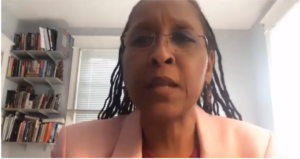 The U.S. government is closely monitoring and encouraging the work of the civilian-led transitional government (CLTG), said Deputy Assistant Secretary Makila James (right), paying tribute to three civil society groups representing youth, women, and rural communities, key constituencies engaged in the 2019 revolution that deposed Bashir’s autocratic regime.
The U.S. government is closely monitoring and encouraging the work of the civilian-led transitional government (CLTG), said Deputy Assistant Secretary Makila James (right), paying tribute to three civil society groups representing youth, women, and rural communities, key constituencies engaged in the 2019 revolution that deposed Bashir’s autocratic regime.
“Moving forward with the appointment of a Transitional Legislative Council and civilian governors is essential to the successful progress of the transition, and we are encouraging the CLTG to move quickly in this regard,” James said, adding that she is “encouraged the Constitutional Declaration includes a provision for a 40 percent quota for women in the Transitional Legislative Council once it is formed.”
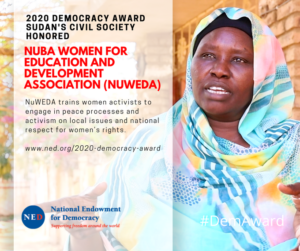 NED recognized the Regional Centre for Development and Training of Civil Society (RCDCS), the Nuba Women for Education and Development Association (NuWEDA) and the Darfur Bar Association (DBA) with its 2020 Democracy Award for “working tirelessly to strengthen civil society in Sudan.”
NED recognized the Regional Centre for Development and Training of Civil Society (RCDCS), the Nuba Women for Education and Development Association (NuWEDA) and the Darfur Bar Association (DBA) with its 2020 Democracy Award for “working tirelessly to strengthen civil society in Sudan.”
“Civil society organisations played a pivotal role despite all the challenges they faced” said Sudan‘s Justice Minister Nasredeen Abdulbari. “They continue to remind us that we need to ensure that the new Sudan is based on human rights.”
Sudan’s progress toward independent media and free expression “is one of the great achievements of the December 2019 revolution,” Abdulbari added in a “fireside chat” with NED Board member Linda Thomas-Greenfield.
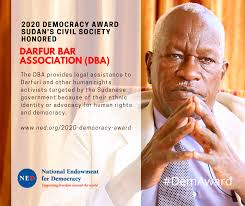 The overwhelmingly Muslim north African nation has decided to introduce a host of political reforms that experts hope will improve the lives of the Sudanese people, especially women and minority faith groups, reports suggest.
The overwhelmingly Muslim north African nation has decided to introduce a host of political reforms that experts hope will improve the lives of the Sudanese people, especially women and minority faith groups, reports suggest.
“We are keen to demolish any discrimination that was enacted by the old regime and to move toward equality of citizenship and a democratic transformation,” Abdulbari told the BBC.
While paying tribute to Sudan’s democracy advocates, participants were under no illusions over the fragility of the transitional process.
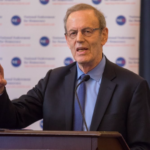 “Sudan’s transition faces immense challenges, but it provides a rare opportunity to transform one of the world’s pariah states,” said NED President Carl Gershman, adding that with NED’s grant-making program engaged in the country continuously since 1989 “the success of the December Revolution has only deepened our commitment to the Sudanese people.”
“Sudan’s transition faces immense challenges, but it provides a rare opportunity to transform one of the world’s pariah states,” said NED President Carl Gershman, adding that with NED’s grant-making program engaged in the country continuously since 1989 “the success of the December Revolution has only deepened our commitment to the Sudanese people.”
The awardees are not only “broadly representative of the young people, the women, and the marginalized groups who led the struggle for democracy,” he observed, but “played a vital role in bringing about Sudan’s political breakthrough, and they will be key actors in the process of democratic transition that is beginning to unfold.”
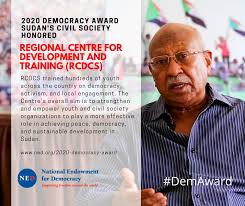 The experience of Sudan’s civil society “demonstrated how through resilience, commitments, dedication of concerted efforts of solidarity with other civil groups, it would be possible to break through the challenges and barriers of the previous regime, and proceed to the dawn of freedom, peace and justice of the Great December Revolution,” said Abdel Mitaal Mohammed Ahmed Girshab, RCDCS director general.
The experience of Sudan’s civil society “demonstrated how through resilience, commitments, dedication of concerted efforts of solidarity with other civil groups, it would be possible to break through the challenges and barriers of the previous regime, and proceed to the dawn of freedom, peace and justice of the Great December Revolution,” said Abdel Mitaal Mohammed Ahmed Girshab, RCDCS director general.
But the revolution’s slogan of “Freedom, Peace and Justice” has yet to be realized, one awardee conceded.
“Renewed vigour as well as more and more efforts and human and material resources are therefore needed,” said Abdelrahman Mohamed Al Gasim, a co-founder of the Darfur Bar Association. “This is because the former regime left behind a heavy legacy of injustice, inequality and inequity as well as ideological backwardness and broken society and institutions.”
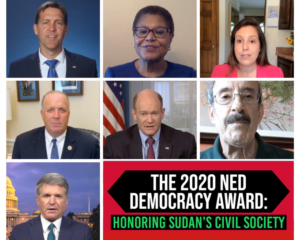 Rep. KarenBass paid tribute to the Nuba Women for Education and Development Association.
Rep. KarenBass paid tribute to the Nuba Women for Education and Development Association.
“These women have been and will continue to be important local and national voices for enshrining women and human rights in democratic Sudan,” she said.
International solidarity is essential to avoid a restoration of the old regime, the meeting was told.
“The international community must work with groups like those being honored today to ensure that the remnants of the old authoritarian regime never again destabilize Sudan and suppress its citizens,” said Rep. Eliot Engel (above) of the House Foreign Affairs Committee.
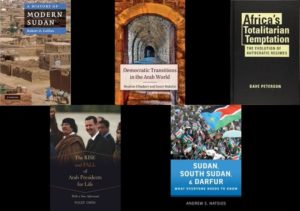
Credit: DRC
The peaceful nature of the transition was all the more remarkable given the old regime’s violent record, added Rep. Michael McCaul (above).
“After 30 years of tyranny, the Sudanese people stood peacefully together in the streets of Khartoum and across Sudan to oppose government corruption, abuse, and violence,” he told the NED event.
National Endowment for Democracy board member @Rep. Elise Stefanik (above) presented the 2020 #DemAward to The Darfur Bar Association.
“It is youth and women in Sudan that will be a driving force for success and change in Sudan,” said Rep Dan Kildee (above).
The event concluded with a discussion between the three awardees and @Newshour‘s @nickschifrin (below).
Join us NOW to talk with inspiring #demaward recipients https://t.co/HYij6UcIaJ
— Nick Schifrin (@nickschifrin) July 22, 2020







